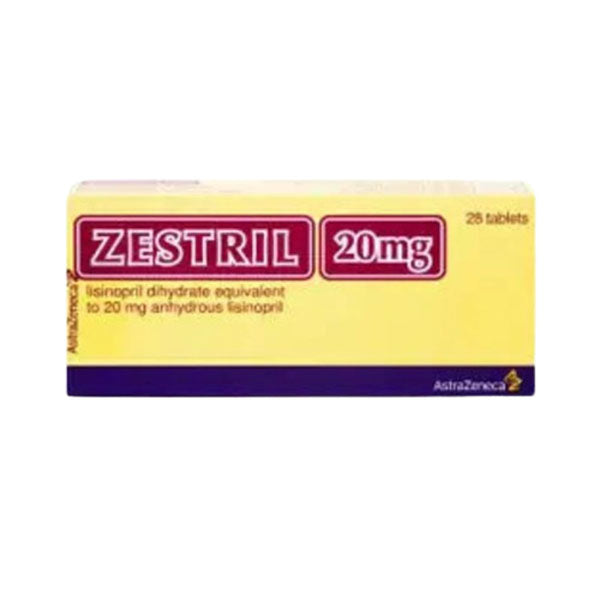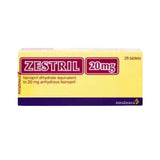Zestril 20 mg 28 tablets:
Lisinopril 20 mg tablets.
What is lisinopril and what is it used for?
- Lisinopril belongs to a group of medicines called angiotensin-converting enzyme (ACE) inhibitors.
- It works by making blood vessels dilate. This helps lower blood pressure. It also makes it easier for your heart to pump blood to all parts of your body.
It can be used for the following conditions:
- To treat high blood pressure (hypertension).
- To treat heart failure.
- If you have recently had a heart attack (myocardial infarction).
- To treat kidney problems caused by type 2 diabetes in people with high blood pressure.
How to take lisinopril:
grown ups
Your dosage is based on your medical condition and whether you are taking any other medications. Your doctor will tell you how many tablets to take each day. Consult your doctor or pharmacist if you are not sure.
- For high blood pressure: The recommended starting dose is 10 mg once a day. The usual long-term dose is 20 mg once a day.
- For heart failure: The recommended starting dose is 2.5 mg once a day. Long-term dosage is 5 to 35 mg once a day.
- After a heart attack: The recommended starting dose is 5 mg within 24 hours of the attack and 5 mg one day later. The usual long-term dose is 10 mg once a day.
- For kidney problems caused by diabetes: The recommended dose is either 10 mg or 20 mg once a day. If you are elderly, have kidney problems, or take diuretic medications, your doctor may give you a lower than usual dose.
Use in children and adolescents (6 to 16 years) with high blood pressure
- This medication is not recommended for children under 6 years of age or for children with severe kidney problems.
- Your doctor will determine the correct dose for your child. The dosage depends on the child's body weight.
- For children weighing between 20 kg and 50 kg, the recommended starting dose is 2.5 mg once a day.
- For children weighing more than 50 kg, the recommended starting dose is 5 mg once a day.
- Swallow the tablet with a drink of water.
- Try to take your tablets at the same time every day. It does not matter if you take it before or after food.
- Keep taking lisinopril for as long as your doctor tells you to, as it is a long-term treatment.
Do not take lisinopril:
-
If you are allergic to lisinopril or any of the other ingredients of this medication
- If you have ever had an allergic reaction to another ACE inhibitor medicine. The allergic reaction may have caused swelling of the hands, feet, ankles, face, lips, tongue or throat. It may also have made it difficult to swallow or breathe (angioedema).
- If you have taken or are currently taking sacubitril/valsartan, a medicine used to treat a long-term (chronic) type of heart failure in adults, your risk of developing angioedema (rapid swelling under the skin in an area such as the throat) may be increased.
- If someone in your family has had severe allergic reactions (angioedema) to ACE inhibitors or you have had severe allergic reactions (angioedema) without a known cause.
- If you are pregnant for more than 3 months.
- If you have diabetes or kidney dysfunction and are being treated with a blood pressure lowering medicine containing aliskiren.
Warnings and precautions:
Talk to your doctor or pharmacist before taking lisinopril if you:
- Narrowing (narrowing) of the aorta (an artery in your heart) or narrowing of the heart valves (mitral valves).
- You have a narrowing (stenosis) of the renal artery.
- An increase in the thickness of the heart muscle (known as cardiomegaly).
- You have problems with your blood vessels (collagen vascular disease).
- Reduction of Blood pressure. You may notice this as a feeling of dizziness or lightheadedness, especially when standing.
- You have kidney problems or are on dialysis.
- They have liver problems.
- He has diabetes.
- Taking any of the following medications used to treat high blood pressure: angiotensin II receptor blockers (ARBs), aliskiren
- You have recently had diarrhea or vomiting (sickness).
- You have high cholesterol levels and are undergoing treatment called "LDL apheresis."
- Of black origin because lisinopril may be less effective. You may also get the side effect more easily of angioedema (severe allergic reaction).
Possible side effects of lisinopril:
Common side effects
- Headache.
- Feeling dizzy or dizzy, especially if you stand up quickly.
- Diarrhea.
- Dry cough that doesn't go away.
- Being sick (vomiting).
- Kidney problems (shown in a blood test).
Other medications and lisinopril:
In particular, tell your doctor or pharmacist if you are taking any of the following medicines:
-
Other medications to help lower blood pressure.
-
Angiotensin II receptor blockers (ARB) or aliskiren.
-
Water tablets (diuretics).
-
Beta blocker medications, such as atenolol and propranolol.
-
Nitrate medications (for heart problems).
-
Nonsteroidal anti-inflammatory drugs (NSAIDs) used to treat pain and arthritis.
-
Aspirin (acetylsalicylic acid) if you take more than 3 grams each day.
-
Medicines for depression and mental problems including lithium.
-
potassium supplements (including salt substitutes), potassium-sparing diuretics, and other medications that can increase the amount of potassium in the blood (such as trimethoprim and co-trimoxazole for infections caused by bacteria; cyclosporine, an immunosuppressive medication used to prevent rejection of transplanted organs; heparin, A medicine used to thin the blood to prevent clots.
-
Insulin or medications you take by mouth for diabetes.
-
Medicines used to treat asthma.
-
Medicines for nasal or sinus congestion or other cold treatments (including medicines you can buy at a pharmacy).
-
Medicines to suppress the body's immune response (immunosuppressants).
-
Allopurinol (for gout).
-
Procainamide for heart rhythm problems.
- Medicines containing gold, such as sodium aurothiomalate, which may be given to you as an injection.


